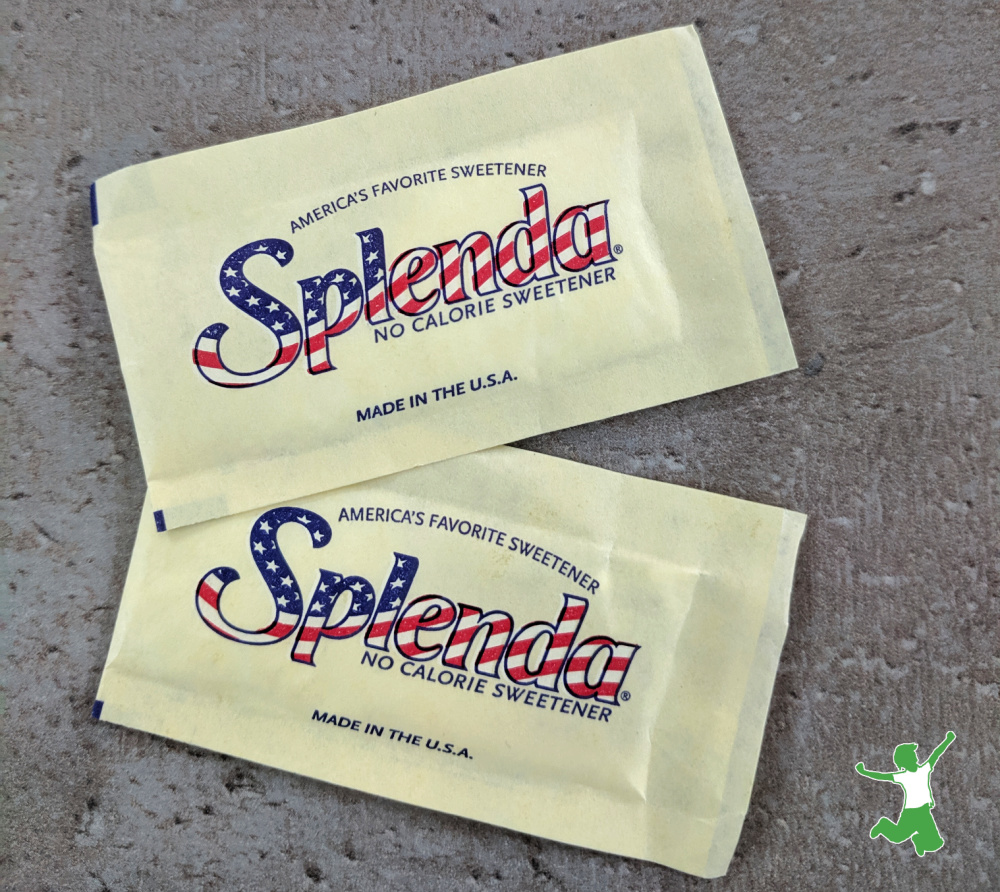
Table of Contents[Hide][Show]
Sucralose known most popularly by the brand name Splenda is a toxic alternative sweetener that damages DNA according to peer-reviewed research.
When it comes to alternative sweeteners, sucralose, more popularly known by the brand name Splenda, is one of the most widespread in the food supply.
Tables in restaurants commonly offer the tiny yellow packets of Splenda along with pink (Sweet and Low) and white (white sugar) packets as options for sweetening tea and coffee.
Sucralose is also a popular alternative sweetener in reduced-sugar beverages, energy drinks, bars, and snacks.
The stuff is everywhere if you are an avid label-reader like me, including many products that target children.
While the evidence against consumption of sucralose has been quite strong for many years, the most recent research is perhaps the most damning of all.
Sucralose not only shrinks the thymus gland, damages gut flora, elevates heart disease risk, metabolizes into toxic compounds, encourages the development of diabetes by hampering insulin, and boosts the risk of obesity and metabolic syndrome.
It also damages human DNA that is exposed to it!
WebMD now calls sucralose “genotoxic”. (1)
You know a substance must REALLY be bad if WebMD and other conventional health sites are warning about it!
Sucralose Does Not Pass Through Gut Intact
This latest research on sucralose refutes the long-held belief that this alternative sweetener passes through the gut unmetabolized.
In fact, sucralose breaks down into its components in the intestinal tract.
One of these compounds is sucralose-6-acetate, the substance responsible for DNA destruction.
Susan Schiffman, corresponding author of the study and an adjunct professor in the joint department of biomedical engineering at North Carolina State University and the University of North Carolina at Chapel Hill describes the problem as follows:
Our new work establishes that sucralose-6-acetate is genotoxic. We also found that trace amounts of sucralose-6-acetate can be found in off-the-shelf sucralose, even before it is consumed and metabolized.
To put this in context, the European Food Safety Authority has a threshold of toxicological concern for all genotoxic substances of 0.15 micrograms per person per day. Our work suggests that the trace amounts of sucralose-6-acetate in a single, daily sucralose-sweetened drink exceed that threshold. And that’s not even accounting for the amount of sucralose-6-acetate produced as metabolites after people consume sucralose. (2)
The researchers exposed human blood cells to sucralose-6-acetate in vitro.
They also exposed the chemical to human gut cells.
In both scenarios, the sucralose-6-acetate proved genotoxic, meaning that it effectively broke up the DNA in cells that were exposed to the chemical. (3)
Leaky Gut Trigger
Earlier research indicated that sucralose damages gut flora.
However, Schiffman reports that this latest research confirms that the sweetener not only damages gut flora. It is also a direct contributor to leaky gut, the foundation of all autoimmune disease.
Other studies have found that sucralose can adversely affect gut health, so we wanted to see what might be happening there. When we exposed sucralose and sucralose-6-acetate to gut epithelial tissues – the tissue that lines your gut wall – we found that both chemicals cause ‘leaky gut.’ Basically, they make the wall of the gut more permeable. The chemicals damage the ‘tight junctions,’ or interfaces, where cells in the gut wall connect to each other.
A leaky gut is problematic, because it means that things that would normally be flushed out of the body in feces are instead leaking out of the gut and being absorbed into the bloodstream. (4)
Carcinogenicity
Perhaps the worst piece of evidence that emerged from this study is that sucralose increased activity in genes related to carcinogenicity. This means that consumption could contribute to the development of cancer.
Schiffman did not mince words in her conclusion. She said her team’s research raises “a host of concerns about the potential health effects associated with sucralose and its metabolites sucralose-6-acetate”.
Lead Researcher: Do Not Eat This!
Schiffman went a step further saying that it was time for the FDA to revisit whether sucralose should even be approved for human consumption in the regulatory code.
She concluded by saying that “the evidence is mounting that it carries significant risks. If nothing else, I encourage people to avoid products containing sucralose. It’s something you should not be eating.” (5)
That is some of the strongest summary language I have ever seen in a food study.
Usually, the researchers simply say that “more research is needed” to confirm this or that.
Schiffman did not go this route. She flat-out said…do not eat this stuff.
Smart consumers will heed her words!
(1) Sucralose is Genotoxic
(2 – 4) Chemical found in common sweetener damages DNA
(5) Toxicological and pharmacokinetic properties of sucralose-6-acetate and its parent sucralose